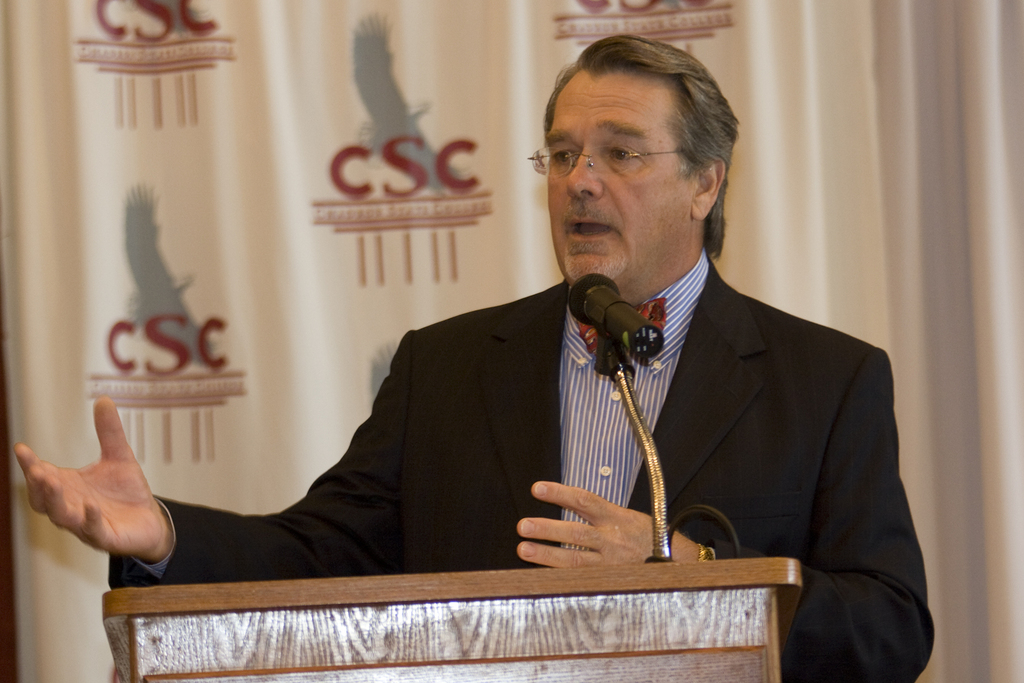NSCS chancellor delivers 'State of the System' address

The chancellor of the Nebraska State College System outlined many positive developments within the system and told of challenges facing higher education during his annual “State of the System Address” on Thursday. Dr. Stan Carpenter’s address at Chadron State College preceded the meeting of the NSCS Board of Trustees which will be Friday morning at 9 a.m. in the Chicoine Atrium of the Sandoz Center.
The positives, he said, included a 3.3 percent enrollment increase for the system’s three institutions this fall, a 5.3 percent increase in state appropriations for the fiscal year, and the partnership with Gov. Dave Heineman to offer the Governor’s Opportunity Award, a scholarship program that was implemented for Nebraska students earlier this year.
Also among the success stories are the NSCS’s offerings in online learning and programs that offer college credit to students who take courses while still in high school, he said.
Carpenter said the advent of Internet learning has not only improved accessibility to courses, but that the credibility of the method is increasing. Most chief academic officers who were recently surveyed believe that the learning outcomes of their institutions’ online programs were comparable or better than their traditional programs, he said.
Carpenter also noted students have financial incentive to enroll in college. He said that tuition has greatly increased in recent years as a means to help colleges and universities continue to operate and provide a quality learning environment. Despite the higher cost of earning an education, he said people who earn bachelor’s degrees gain about $1 million in lifetime earnings over those with just a high school diploma. Carpenter said most college graduates enjoy a higher quality of life and that, on average, the wages of only college graduates have increased above inflation since 2000.
“We know there is an economic impact of educational attainment,” Carpenter said. “Financially, earning a college degree is a wise choice. Those with the most education have prospered while those with the least education have seen declines in real income.”
Despite all of the positives, Carpenter said many challenges face the NSCS and other institutions of higher education. He challenged the employees of the Nebraska State College System to deal with a number of changing demographics, including a declining number of high school graduates in Nebraska.
Carpenter said many new opportunities exist for higher education institutions as the number of minorities from various ethnic backgrounds, elderly Americans and other non-traditional students is increasing both in Nebraska and nationwide.
Carpenter also spoke about the overwhelming amount of information facing today’s traditional college student, most of which has been brought about by technological advances.
“The students of today are different from many of you and me, different in their behaviors, different in their experiences and different in their expectations when they come to college and sit in your classrooms,” he said. “That means we in higher education and in other areas including business and industry, can’t keep doing things the way we’ve always done them – in what we feel is the traditional way.”
A national challenge, he said, is the increasing competition of educational advances in countries such as China and India. He noted that the United States had 1.3 million college graduates in 2006 compared to 3.1 million in India and 3.3 million in China. Those countries, when compared to the United States, turn out a larger percentage of graduates in science and technology – areas that represent a high growth and high demand jobs.
“Higher education, generally, and we in the Nebraska State College System specifically, must work to overcome obstacles that now discourage students from pursuing science and technology careers,” Carpenter said.
Category: Campus News
